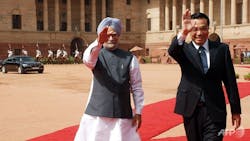NEW DELHI -- Visiting Premier Li Keqiang promised Tuesday to open China's vast domestic market wider to India and forge a "dynamic trade balance" to deepen economic ties and ease tensions between the Asian giants.
The trade push, which the countries say will supply "new engines" to lift the stumbling global economy, came amid efforts by the nuclear-armed powers to put a military dispute along their contested Himalayan border behind them.
"We have the ability to mitigate the trade imbalance between our two countries," Li told business leaders in New Delhi, responding to Indian worries over trade that is heavily skewed in China's favor.
"The Chinese side is willing to provide facilitation for more Indian products to access the Chinese market," added Li, who chose to make India his first foreign stop after taking office two months ago.
He also said China was willing to "launch negotiations on a China-India regional trading arrangement" but did not elaborate.
China is India's biggest trading partner, with two-way commerce totaling $67.83 billion in the last fiscal year to March 2013, up from $2.1 billion in 2001-02. But India's trade deficit with its neighbor soared to $40.77 billion last year from just $1.08 billion in 2001-02, Indian figures show.
Li said he wants a "dynamic trade balance" as the neighbors aim to raise two-way trade to $100 billion by 2015, and said they had "huge markets with huge potential."
But previous Chinese commitments have failed to narrow the imbalance.
"The two countries must now take corrective steps," B.G. Verghese, fellow at the Centre for Policy Research in New Delhi, said, adding the balancing process could take five to seven years.
"There must be market access on the Chinese side and the Indians must produce the manufactured goods the Chinese need," he said, adding deeper trade involvement brings "deeper vested interest in all-round stability."
In his speech, Li reiterated China's desire to build trust with India after both sides agreed Monday to work towards settling the long-running dispute over their still formally undefined border. Ties have been dogged by mutual suspicion, the legacy of a brief 1962 border war. China also views the presence in India of Tibet's spiritual leader the Dalai Lama, who campaigns for "genuine autonomy" for his homeland, as a serious irritant.
Li said China understands "balanced trade is crucial to good ties between the world's two most populous countries" and that "a peaceful and stable South Asia is consistent with China's development interests."
"Only a dynamic trade balance is a sustainable trade relationship," he said.
"We will support Chinese enterprises to increase investments in India and help Indian products have access to Chinese markets," he said.
India is seeking Chinese participation in its special manufacturing zones or SEZs being set up under its National Manufacturing Policy, which aims to sharply increase manufacturing to provide jobs for its growing army of young people.
On Tuesday the countries signed deals to raise Indian access to China's drugs market and promote trade in fish and meat products.
Both nations' economies have slowed due to the global downturn and in India's case due to high interest rates, corruption scandals and government policy paralysis that have dampened business activity.
Li was travelling later Tuesday to India's financial hub Mumbai before heading to Pakistan and later to Switzerland and Germany.
-Penny MacRae, AFP
Copyright Agence France-Presse, 2013
About the Author
Agence France-Presse
Copyright Agence France-Presse, 2002-2025. AFP text, photos, graphics and logos shall not be reproduced, published, broadcast, rewritten for broadcast or publication or redistributed directly or indirectly in any medium. AFP shall not be held liable for any delays, inaccuracies, errors or omissions in any AFP content, or for any actions taken in consequence.
